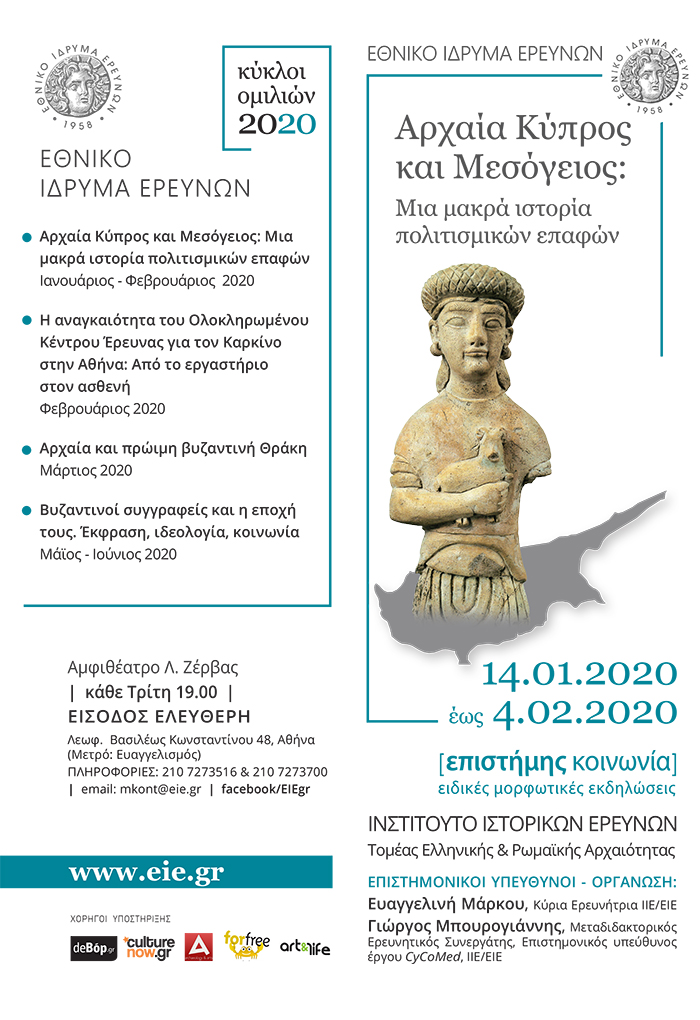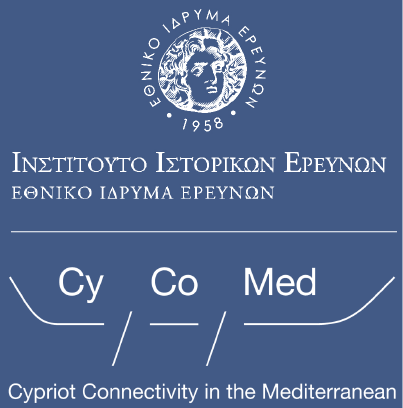Ancient Cyprus and the Mediterranean: A long history of cultural contacts

One of the chief dissemination activities of the CyCoMed project was the educational lecture series “Αρχαία Κύπρος και Μεσόγειος: Μια μακρά ιστορία πολιτισμικών επαφών” (Ancient Cyprus and the Mediterranean: A long history of cultural contacts). The lectures were organised in the frame of the educational lectures programme “Επιστήμης Κοινωνία» by Dr Evangeline Markou, senior researcher of the Institute of Historical Research (IHR) of the National Hellenic Research Foundation (NHRF), as well as member of the scientific team of the CyCoMed project, and the principal investigator of the CyCoMed project, Dr Giorgos Bourogiannis.
The lectures were given in Greek. They were hosted at the L. Zervas lecture hall of the NHRF, every Tuesday at 7 pm, from the 14th of January to the 4th of February 2020 (14, 21, 28 January and 4 February). The attendance of the lectures was free of charge. The special role of ancient Cyprus as a place of cultural cross-influence on a broader Mediterranean scale, was the main concept behind the organisation of the lecture series.
Cyprus provides one of the richest and most extensively explored areas of the Mediterranean. Its exceptional geographic location, proximity to Asia Minor, the Syro-Palestinian littoral, Egypt and the Aegean, sufficiency in agricultural products, good quality of timber that was suitable for ship-building and, primarily, the abundance of copper that resulted in systematic metallurgical activities, all contributed to Cyprus’ early developing strong economic and political structures. Cypriot prosperity is masterfully reflected on the island’s dense trade network with the Mediterranean, that is verified archaeologically for at least as early as the 16th century BC, as well as on the cultural dynamism of Cyprus that, unlike the Aegean, experienced no dramatic discontinuities. The aim of the lectures was to put the audience into contact with main aspects of Cypriot antiquity, such as the copper technology, economy, writing and political organisation, as well as with the special dynamism of ancient Cyprus’ external contacts.
The series of lectures was divided into four weekly themes, with two speakers each. The four thematic titles titles and those of their corresponding lecture were:
14 January 2020
1. Ancient Cyprus and the Mediterranean: Economy and trade
- Evangeline Markou (ΙHR/NHRF): Economy and economic policy od ancient Cyprus
- Giorgos Bourogiannis (ΙHR/NHRF): Cyprus and the Aegean in the Early Iron Age
21 January 2020
2. Languages and writing systems
- Kostas Kopanias (National and Kapodistrian University of Athens): Copper and writing systems on Cyprus
- Artemis Karnava (University of Crete): Lingual and social codes of coexistence on Cyprus in the first millennium BC
28 January 2020
3. Cypriots and Phoenicians
- Christina Ioannou (University of Cyprus): The Phoenicians in the daily life of Cyprus
- Vyron Antoniadis (ΙHR/NHRF) Cyprus and Knossos at the dawn of the first millennium BC
4 February 2020
4. Cyprus in the Late Bronze Age
-Giorgos Vavouranakis (National and Kapodistrian University of Athens): The narrative of Cretan and Cypriot art in the Late Bronze Age: Thoughts on the human condition
- Angelos Papadopoulos (IHR/NHRF): In search of the Cypriot: Traders, products and trasanctions in the eastern Mediterranean during the Bronze Age.
